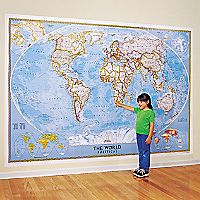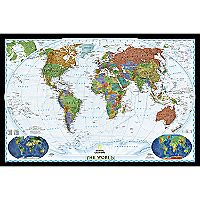12 One of the most fascinating things about history is the amount of it that's been wiped out - on purpose. For example, in the ninth century CE, the greatest library in the world, the Library of Alexandria, was burned in an act of war, and ever since, history buffs have kept themselves tantalized and amused by trying to guess the identity of some of those books we'll never see. From the burning of libraries to the destruction of presidential diaries today, the idea of the lost book holds a certain romantic - albeit frustrating - appeal.
Folks who've studied the history of mathematics have their own "lost library" to wonder about - the treasure trove of early Chinese mathematical treatises burned by the order of Emperor Qin Shi Huang in 212 BCE.
China has been on the leading edge of math for nearly as long as civilization has existed. Evidence of a highly developed number system has emerged from as far back as the Shin Dynasty period - 1600 to 1046 years before Christ. This early Chinese number system also includes decimals, a major intellectual breakthrough in itself. To write the number 260, for example, you'd write the number two, followed by the symbol for a hundred, then six followed by the symbol for ten - You get the idea. There's also evidence that Chinese mathematicians had developed their own version of the abacus (an ancient calculating machine that used rods with movable counters) from a very early period. So whatever was contained in those burned math books of 212 BCE, it was probably significant work.
A handful of early Chinese mathematical works did survive this public purging (the reasons for which aren't clear). From as long ago as 1046 BCE, we have the I Ching, a favorite of '60s hippies and of mystics even today, and the Mo Jing, a compilation of geometry and physical science dating from around the fifth century BCE. These two survivors illustrate the high level of intellectualism and imagination characteristic of ancient Chinese math.
Writers during the Han dynasty period - a four-hundred-year stretch of time that begins in 202 BCE and extends to 220 CE - did their best to preserve and build upon what was known of math in China before the burning of 212. The Han mathematicians were synthesists, putting together the best insights of ancient thinkers, and their most important work was the Nine Chapters on the Mathematical Art. This pivotal compilation illustrates the proper way to use geometry to build a structurally sound dwelling; it also shows that Chinese mathematicians understood pi (the seemingly-unending number by which we calculate the circumference of a circle) and various laws concerning right triangles. Perhaps most strikingly, it uses Cavalieri's principle for figuring out the volume of a shape - but it does so more than a thousand years before Cavalieri came up with the idea. In other words, Chinese mathematicians understood some geometrical ideas a good while before anyone in the West did.
Elsewhere during the Han dynasty, other Chinese mathematicians were also "getting there first," including Jing Fang (78-37 BCE), a musical theorist who discovered principles of temperament that had to wait, in the West, until the seventeenth century.
For a thousand years following the Han dynasty, Chinese mathematicians continued to yield great insights - all during a time when European mathematicians didn't, strictly speaking, exist. Chinese thinkers developed such ideas as negative numbers (the brilliant invention that helps us all keep our bank balances straight), the use of matrices to solve linear equations (an idea that continues to stump Western eleventh-graders to this day), and elements of calculus and trigonometry. From prehistory to the middle ages, China produced some of the greatest mathematical reasoning ever found.
Still - you wonder what further heights these brilliant thinkers might have scaled if their foundation hadn't been partially destroyed. Just as playwrights and poets today lament the great tragedies and epics that were probably lost in the burning of the library of Alexandria, historians of human genius must wonder what wonderful insights fell victim to the pride of Emperor Qin Shi Huang. (His order, after all, only pertained to provinces of China that fell outside his own state of Qin - so presumably, though we don't know for sure, he only wanted people from his own part of China to be able to read for themselves.) On the other hand, maybe he did Chinese math a favor. By giving the Han dynasty mathematicians the impetus to save and consolidate every scrap of mathematical lore still available, perhaps he lit another fire - one he never intended.
About the Author:
Math Made Easy provides Math help for Algebra help, Geometry help, math homework help using math online tutorial services and math tutorial cd so you can watch your math scores soar.
Article Source:
http://www.freearticles.co.za/culture-and-society/china-dynasty-mathematical-genius.html
Tuesday, December 9, 2008
Subscribe to:
Post Comments (Atom)






No comments:
Post a Comment